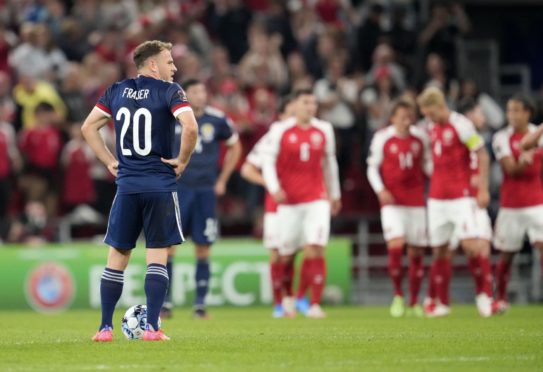Scotland going down 2-0 to a team of Denmark’s quality, on the face of it at least, should not provide reason for a crisis.
But 45 minutes of apathy ultimately left Steve Clarke’s side playing the rest of the game with an arm tied behind their back.
Their first half performance was grim and insipid. Everything they needed not to be on a homecoming night for Denmark in their home stadium.
Losing two goals and offering little reason for encouragement meant that anything they mustered in the second half was likely to be rendered moot.
For all the talk pre-game about what team Clarke would pick, given the Covid issues affecting the squad, Scotland’s night being undone was not down to team selection or players playing out of position. It was basic errors.
The first came from one of the most notable players in the Scotland side. They stood off Pierre-Emile Hojbjerg as the Spurs midfielder floated a ball over the visiting defence, where Daniel Wass was able to peel to the wrong side of Kieran Tierney and angle a header back across goal, leaving Craig Gordon stranded.
Daniel Wass was able to peel to the wrong side of Kieran Tierney and angle a header back across goal, leaving Craig Gordon stranded.
The second came within 90 seconds, executed with the same ruthless fluidity that garnered Denmark so much praise during their run to the Euro 2020 semi-finals.
Joakim Maehle, one of the tournament’s stars, started and finished the move, collecting a wonderful pass from Mikkel Damsgaard and finishing beyond Gordon.
The lessons did not seem to be learned. Red shirts were continually escaping their supposed markers at set-pieces; are the Danes really that elusive or perhaps was the organisation of this Scotland team just not up to scratch?
The pedigree of this Denmark side cannot be underestimated. They are clearly hitting their peak as a squad, with a mixture of top-level experience in the likes of Kasper Schmeichel, Simon Kjaer and Daniel Wass, elite-level Premier League players in Hojbjerg and Andreas Christensen and individuals enjoying a burgeoning rise in Maehle and Damsgaard.
It would be easy to slap a “harsh lessons” tag on this game and be done with it. In some respects the first half was similar to the games against Belgium in qualifying for the Euros, where positive moments were few and Scotland were left clinging on for dear life for most of the evening.
But if Scotland aspire to be regulars at this level and competing in tournaments, these are the type of games they have to find a way of dealing with. They did it against England at Wembley but performances like that have been few and far between.
The change of system at half-time was needed because Scotland simply offered nothing going forward. Lyndon Dykes coming on for Scott McKenna, with Fraser moving to wing-back and Tierney to centre-half, at least gave Clarke’s side the option of an out-ball.
But there are also lessons to be drawn in the way both sides play with a back three.
Denmark have Christensen in the middle of their three and he is comfortable supplementing the midfield two by stepping forward in possession. That allows greater freedom for manager Kasper Hjulmand in picking more dynamic forward players, having someone he can trust to flit between defence and midfield effortlessly.
Scotland do not have that. Particularly in the first half, you had three centre-halves that want to do little more than defend, three sitting midfielders and an isolated front two. Fluidity is very rarely an option.
At least with Tierney in the three, there is a player willing to carry the ball out of defence and help provide overloads in certain areas. It was the crux of why that partnership with Robertson on the left was working so well.
While Scotland reclaimed a semblance of respectability in the second period, the damage had already been done. Denmark were comfortable and never looked like relinquishing their lead, even with chances for Gilmour and a late one from Fraser.
Gilmour showed glimpses of why he should have a huge future at this level, with a willingness to take the ball under pressure and strive to create something, even with his team behind.
He was replaced late on by Aberdeen’s Lewis Ferguson, who may not carry too many fond memories of his international bow.
Even with a depleted side, Scotland ought to have delivered more.



